Every, concentrators from the MCB, CPB, and Neuroscience concentrations graduate and move on to fellowships, graduate programs, and industry jobs.
This year, our graduating seniors garnered an impressive array of fellowships that will support research, philanthropic endeavors, and creative projects. Below are snapshots of where a handful of our newly-minted graduates are headed:

Maya Almoussa
MCB concentrator Maya Almoussa (‘21) was awarded the Carl and Lily Pforzheimer Foundation Public Service Fellowship and Steve Reifenberg Travel Fellowship to work with the Center for Justice and International Law (CEJIL) in Washington D.C and Argentina.
She was also offered a DAAD Fellowship that would have allowed her to study international health in Berlin and the Postgraduate Traveling Fellowship that would have enabled her to study Buddhism in Brazil but chose to decline those fellowship offers.
“I hope to work in medicine and the humanitarian sector in the future, so I want to learn about the human rights and legal perspective to inequities through my time at CEJIL,” Almoussa says.
Going forward, Almoussa is eager to connect with professional communities that deeply care about addressing health inequities. “Being part of the MCB community made me realize that I want my future professional endeavours to contain a great community that I can rely on,” she says. “The MCB community was always there for me and my peers during stressful times, so it taught me to look for a welcoming community to be part of!”
Like many, Almoussa has found the past year to be a challenging one but says that social distancing has encouraged her and her friends to be more intentional about finding time to hang out together.
She adds, “A huge thank you to the MCB department for giving us a space to be ourselves and stop by at any time of the day! I hope that as we all go into amazing future professional endeavours, we don’t forget to be ourselves and enjoy the little moments that make our work and choices worthwhile!”
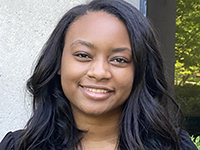
Ashley Cooper
Ashley Cooper (Neuroscience and Anthropology ‘21) is pursuing her interdisciplinary interests in the Health, Medicine, and Society Program at the University of Cambridge, thanks to a Lionel de Jersey Scholarship she received through the Harvard-Cambridge Scholarship program.
“The program is a joint initiative by the departments of History of Medicine, Medical Sociology, Philosophy & Ethics of Medicine, and Medical Anthropology,” Cooper explains. “During my undergraduate studies I really fell in love with analyzing medical and biological concepts from a social science perspective. I hope to explore writing and research methodology across all four of these disciplines during my time at Cambridge.”
Cooper is passionate about increasing access to mental healthcare for Black women and Black youth. “I think that elucidating historical and systemic barriers is a key component to unearthing how Black individuals may be liberated from the notion that they are unworthy of receiving mental healthcare,” she says. “So while at Cambridge, I hope to pursue a project focused on how the Strong Black Women Archetype (SBWA) is perpetuated by society’s adultification of Black girls. I specifically want to evaluate these two concepts through the lens of depression.”
Most previous research on the psychological effects of the SBWA has focused on adult women, so Cooper aims to explore its effect on Black girlhood. Young Black people also often experience “adultification,” where others erroneously ascribe the traits of grown adults to Black children. “I hypothesize that the adultification of Black girls—the prejudice of ascribing increased maturity to Black girls—perpetuates, and is intimately connected to, the SBWA and informs Black women and girls’ isolation and alienation from mental healthcare, particularly for depression,” Cooper says. “I will explore how this affects clinician bias towards Black girls and how that is translated through diagnoses, treatment, policy priorities, diagnostic DSM rhetoric, and medical advertisements.”
While at Cambridge, Cooper also plans to explore her longtime interests in writing poetry and theatre. “This year, I have tried to be more present each day by allocating time to just reflect while listening to music, and also giving myself time to read a bit each day,” she says. “Next year, I hope to continue sitting in gratitude for the concept of time.”
Cooper is excited for the upcoming year and deeply grateful to her support network, saying, “I am eternally thankful to have been uplifted by friends, family, and my advisors during this time—it has been so essential to my progress and being able to continue on during an exceptionally harrowing year. I am incredibly grateful for you all.”
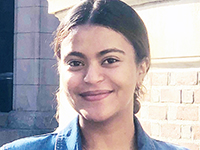
Leena Hamad
MCB concentrator Leena Hamad (‘21) was selected as a recipient of the Lt. Charles H. Fiske III Scholarship, which enables recent graduates to read for graduate degrees at University of Cambridge’s Trinity College.
“With the support of the Harvard-Cambridge Scholarship, I’ll be doing a 1-year MPhil in Health, Medicine, and Society at the University of Cambridge next year,” Hamad says. “It’s a really cool program that combines a variety of disciplines at the intersection of science and the social sciences, such as medical anthropology, history of science, the sociology of medicine, and biomedical ethics. I’m hoping to do research on colonial approaches to public health policy and their long-term impact on health care delivery in under-resourced regions today. More broadly, I’m interested in exploring questions that center around the ethics of public, global, and humanitarian health.”
“I feel that pursuing this program will set me up to be a more conscious and socially responsible physician-scientist,” she adds. “Although my ultimate desire is to do research in the biological sciences, I want my work to intersect with the political realm of science and medicine, working towards making scientific advancements that can be broadly accessible and available to all.”
Like many others in the graduating class, Hamad has found that being more intentional about taking time for self care and for connecting with friends and loved ones have been lifelines. “Looking back on it, I sometimes wonder how we made it all the way through despite all of the challenges,” she says. “But that makes me even more excited for the brighter days ahead.”
Hamad says that being an MCB student and mentoring younger students in the concentration have been extremely valuable experiences. “I’m especially inspired by my fellow students in MCB, whose interests are so wide-ranging and fascinating, and who all dedicate their time to incredible research,” she says. “I’m motivated by the friends I’ve made in MCB and the brilliant mentors and educators I have met through the department, as well.”
She adds, “I’d just like to express my thanks to the MCB community for being the best possible place to spend 4 years—growing as a student, a scientist, and a thinker. My biggest thanks go out to Dominic Mao and Irina Cashen, who have made MCB feel like home.”

Aymen Kabir
Neuroscience concentrator Aymen Kabir (‘21) has been chosen to receive the Michael C. Rockefeller Memorial Fellowship, which supports recent Harvard graduates who immerse themselves in a different culture. Kabir is taking a gap year prior to medical school to travel to Harar, Ethiopia—which is a UNESCO World Heritage site and one of the first cities in Africa to convert to Islam. Kabir plans to explore facets of his identity, including his religion, through spending time in Harar.
“My ethnicity, nationality, and religious beliefs are all interconnected parts of my identity that I have questioned and explored for a large portion of my life,” Kabir says. “By spending my fellowship year in Ethiopia, and specifically spending a significant amount of time in the 1,000-year-old city of Harar, I hope to be able to navigate several aspects of my identity through field work, volunteering, and spending ample amounts of times living between some of the 80+ mosques that exist within the walled city.”
Like many in the Class of ‘21, Kabir spent a significant chunk of his time as a Harvard undergraduate away from Boston. “After having to leave campus and hearing that we wouldn’t be allowed to return for the fall, I felt like I lost what was the most important part of my college experience—the people and conversations I was surrounded with every single day,” he says. “Fortunately, some of my friends and I managed to get together and still spend the fall semester together, but in Los Angeles.” Among these friends were film students, who encouraged Kabir to take a documentary film class. Kabir says that he may continue cultivating filmmaking as a hobby by documenting his time in Ethiopia.
Kabir expressed appreciation for the Neuroscience community’s enthusiasm and support, as well as many fascinating conversations. “I’d also like to give a special shout out to my Neuroscience advisor, Ryan Draft, who brought this fellowship to my attention in the first place and really made me feel like I could navigate my post-grad career in ways that weren’t so typical for STEM concentrators,” Kabir says. “My experiences in Neuro, whether it be with other students or the faculty, have been unforgettable…I’d like to thank MCB and Neuro for allowing my Harvard experience to be one that I will cherish and hold on to forever.”
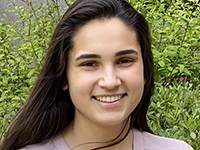
Claire Millett
Neuroscience concentrator Claire Millett (‘21) is joining NYC-based biotech startup Kallyope as a research associate. Millett was offered both a Fulbright Grant and a DAAD Fellowship but chose to join Kallyope’s efforts to develop potential therapeutics by leveraging the gut-brain axis.
“Performing translational neuroscience research and bringing discoveries from the lab into the clinic has been a dream of mine since I decided to concentrate in Neuroscience, and this job gives me the opportunity to do that,” Millett says. “I decided to accept the position instead of pursuing the Fulbright or DAAD fellowships for this reason.”
She adds that being part of the Neuroscience community has helped her navigate these turbulent times. “Neuroscience is the best concentration!” Millett says. “The people I’ve worked with have this wonderful combination of intense curiosity about the brain and a lighthearted approach to life, and that is something I hope to carry forward in my own life.”
“This past year, I think maintaining motivation has been the biggest challenge,” she adds. ”However, knowing what my goals are and having supportive family and friends has helped keep me on track...Thank you so much to everyone who has supported me on this crazy journey! I wouldn’t be here without you.”
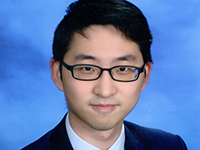
Sang-O Park
MCB concentrator Sang-O Park (‘21) has been awarded the Henry Fellowship from the Harvard-UK Fellowship program, which supports a year of graduate study at either Cambridge or Oxford. He was also offered a Fulbright Grant that would have allowed him to study at the Medical University of Vienna but chose to decline that fellowship offer.
“I intend to read for a MPhil in Biological Science (Stem Cell Biology) at the University of Cambridge where I hope to kickstart a long-term career in developing effective and widely applicable therapeutics at the intersection of neuroscience and regenerative medicine,” he says.
Park feels that his MCB education has prepared him well for the scientific work ahead. “I decided to concentrate in MCB because I wanted an education that 1) focused on biological fundamentals before I moved onto more specialized fields and 2) consistently prioritized the application of coursework to the real world,” he says. “I truly feel like I have achieved both of these goals during my time in MCB and thus feel sufficiently prepared and equipped now to begin this postgraduate experience.“
Despite the constraints of social distancing, Park says that the past year has been an important one for him in terms of developing friendships. “To me, the silver lining of this pandemic while being on-campus has been necessarily spending much more time with my room/blockmates than I would have done if everything had still been in-person…This instead has allowed me to grow much deeper relationships with my friends that have been particularly central to supporting me as I was applying to these postgraduate programs.”
Park adds, “I wanted to give a quick shout-out to the MCB class of 2021: All of you have such an amazing passion for scientific research and innovation and I cannot wait to follow all of your future accomplishments!”
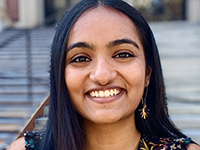
Nivedita Ravi
Neuroscience and Music concentrator Nivi Ravi (‘21) has received an Alex G. Booth Fund Fellowship, which will support an independent research project in musicology. Ravi is studying the history of opera, its performance in postcolonial societies, and the way modern operas are staged in Europe, South Africa, and India.
“At the turn of the 20th century, European settlers built opera houses on the soil of colonies across the globe,” Ravi explains. “Riddled with the pain and trauma of a past era, some of these venues were completely abandoned following independence; other countries, however, embraced the operatic art form. Few scholars have searched for explanations for differing postcolonial relationships with opera. Next spring, I plan to travel the world and publish a series of independent articles to introduce a critical postcolonial operatic perspective to the field of musicology.”
Though her fellowship project is in music, Ravi’s experience as a Neuroscience concentrator has shaped her profoundly. “As a joint concentrator in Neuroscience and Music, I have taken courses related to the human mind and body as well as courses on musicology and music performance,” she says. “Throughout my time in college, I have learned to bridge scientific and humanistic ideas, placing the brain and music in conversation with one another.”
Ravi is looking forward to her fellowship year and to traveling. “As a senior, some of my greatest learning milestones have developed behind a laptop screen in the confines of a dorm room,” she says. “Like many, we try to avoid dwelling on the ‘what-ifs’ and the parallel universe of a normal senior week and commencement. However, I have fought to retain a sense of optimism in my own life, and I am grateful for my roommates, friends, and family who have been my lifelines, especially throughout the past year.”

Vanessa Roser
Neuroscience concentrator Vanessa Roser (‘21) is pursuing neuroscience coursework at University of Cambridge and conducting research in Wolfram Schultz’s lab.
“The goal of my project in the Schultz lab is to analyze how value signals conveyed by the neurotransmitter dopamine are processed within the frontal cortex to encode a preference signal that can predict the probability of selecting one option over alternatives,” Roser says. “Dr. Schultz’s work has been the foundation of my thesis research in the Uchida lab at Harvard, where I investigated how reward information could be transferred to preceding cues through a learning mechanism originally predicted by Dr. Schultz himself.”
Roser adds that she is looking forward to learning more about the neural underpinnings of decision-making.
Reflecting on her experience at Harvard, Roser says that despite the tumultuous year she has been glad to be part of an interdisciplinary community that encourages personal and intellectual growth. She adds that her accomplishments owe much to her friends, family, and support network.
“I especially want to thank my research mentors Dr. Naoshige Uchida and Dr. Ryunosuke Amo for supporting my work in the lab despite all of the challenges and roadblocks impacting scientific research this year,” Roser says. ”I also want to thank Dr. Ryan Draft and Jane Rosenzweig for helping me through an admissions cycle and senior year unlike any other. I cannot express how much their support, and the support of the Uchida Lab community, has meant to me.”
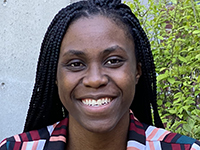
Aba Sam
Neuroscience concentrator Aba Sam (‘21) received an Elliot and Anne Richardson Fellowship for Public Service that will support a year of working with neurodivergent actors at a summer camp and a film project, while also working toward a master’s degree in clinical neuroscience.
“My fellowship project has a couple of moving parts, but the overall goal is to write a movie script that depicts the experience of neurodivergent people in an authentic and respectful way,” Sam says. “My second goal is to develop guidelines for how to create a safe and supportive environment for neurodivergent actors. To do this, I will work at camps for people with neurodevelopmental differences, pursue a Masters in Clinical and Therapeutic Neuroscience, and work with individuals at an acting institute.”
Sam and her brother who has autism share a mutual love for film, so the art form felt like a natural avenue for further exploration of how to support autistic people in creative spaces, she adds.
Though finishing college during a pandemic was uniquely demanding, Sam says that she has found her Neuroscience coursework and spending time with the Neuroscience community to be rewarding. “My time as a neuro concentrator has shown me how challenging, but ultimately rewarding, science can be,” Sam says. “I think the most important part of staying engaged through the setbacks and challenges is keeping perspective. I chose this concentration because I wanted to study the brain and autism in particular. I couldn’t have anticipated half of the challenges that my peers and I faced. However, the end result was so fulfilling and I have so many people to thank. I have grown so much from this experience and I am excited to see what will come next for both me and my classmates.”

Evelyn Wong
Neuroscience and Romance Languages & Literature joint concentrator Evelyn Wong (‘21) has received a British Marshall Scholarship that will support her studies in neuroscience at University College London. Wong is joining Michael Hausser’s lab, a hub for a neural recording technology called all-optical interrogation.
“I want to learn the language of technological development so that I can translate this knowledge into new tools that are accessible in the refugee health setting,” Wong says. “I really admire his philosophy in research, which is that the questions we ask about the world around us shouldn’t be limited to the technologies available to us. A lot of his work focuses on creating new technologies for understanding the mammalian brain and neuropsychiatric disease, so that we can advance our ability to probe the human mind rather than searching for an answer or cure within the confines of our existing toolbox.”
Promoting access to mental healthcare is deeply important to Wong, in part because both of her parents grew up in refugee camps in Thailand in the wake of the Vietnam War. But she is also interested in using neurotechnology to explore fundamental questions.
“My experience as a Neuroscience concentrator has taught me that, when it comes to research and science, the process is just as meaningful and important as the discovery itself,” Wong says. “I’ve realized that the deeper we delve into the human brain, the more questions we have, and that never-ending cycle of questions to explore is what makes the journey so beautiful and exhilarating.”
“I am so grateful to both my Harvard and MIT advisers, Dr. Ryan Draft and Dr. Ed Boyden, for instilling in me a deep appreciation for research,” Wong adds. “They have provided the gift of time and space in which to satisfy my curiosities and learn from success and failure–and that has shaped my outlook, identity, and trajectory in life in so many ways. My only wish is that one day, I can inspire courage in my own students to be confident in their abilities the way they have done for me.”
Congratulations to these wonderful alumni!


